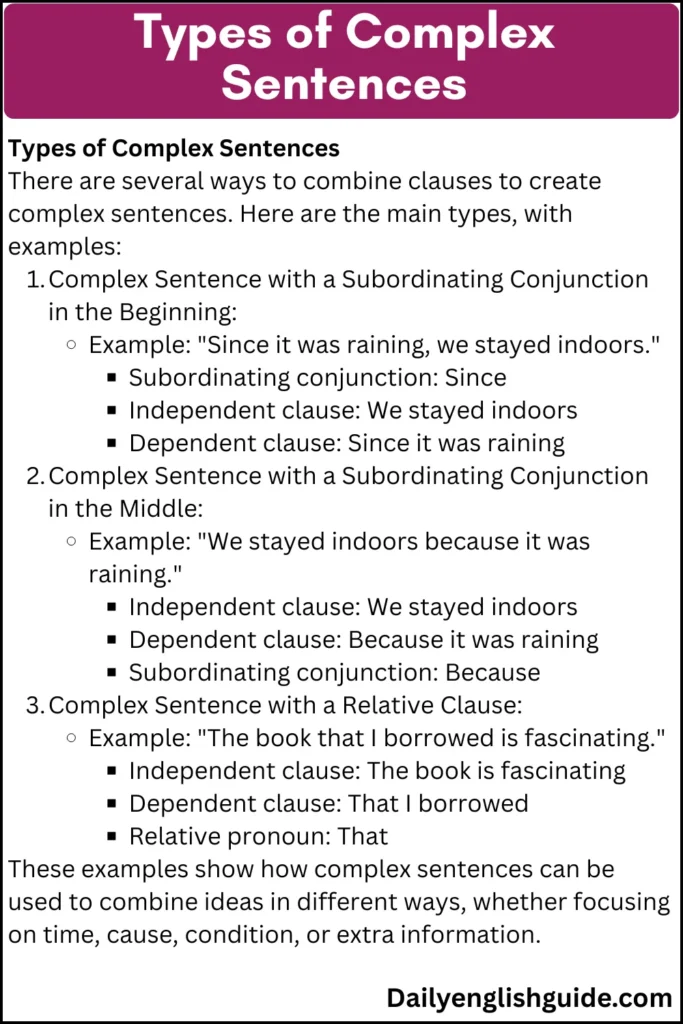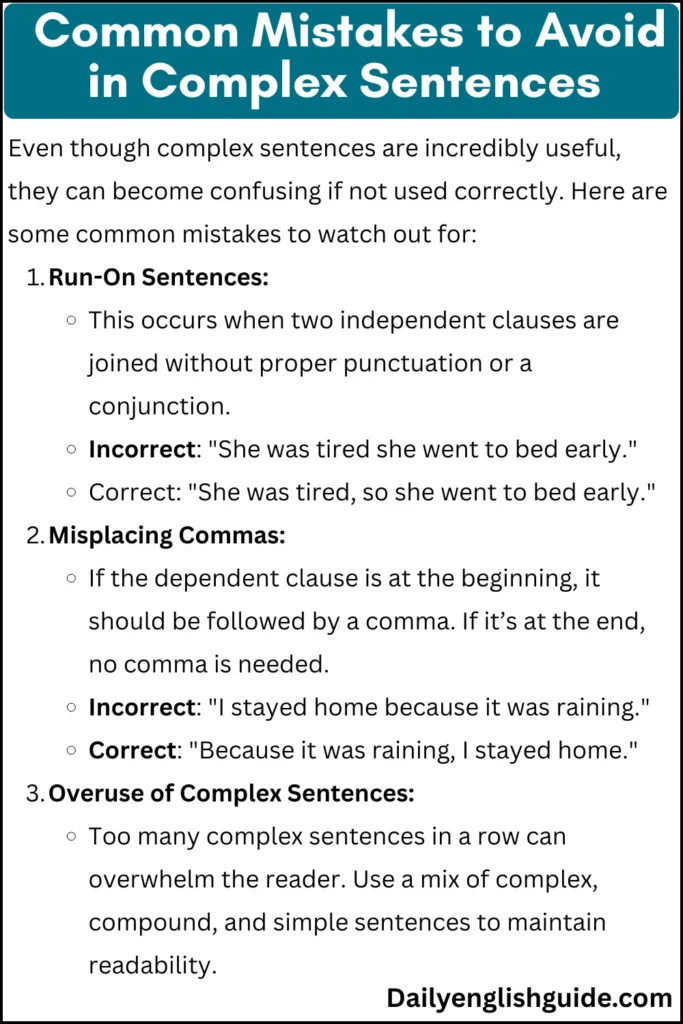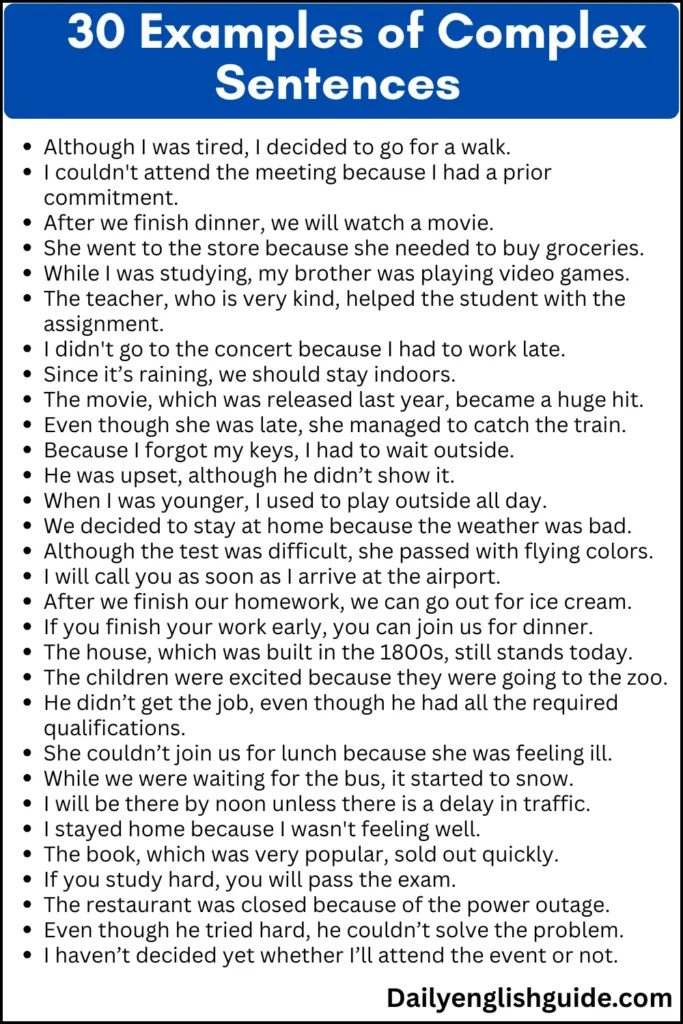In the world of language and writing, sentence structure plays a crucial role in delivering clear and impactful messages. Among the various types of sentences, complex sentences stand out as an essential tool to express sophisticated ideas, connect thoughts seamlessly, and elevate the quality of writing. In this guide, we’ll explore everything you need to know about complex sentences, from their structure to effective usage, along with practical tips and examples.
What is a Complex Sentence?
A complex sentence is a sentence that contains one independent clause and at least one dependent clause. The independent clause is a complete thought that can stand alone as a sentence, while the dependent clause, though it has a subject and a verb, cannot stand alone and depends on the independent clause to form a complete sentence. These clauses are typically connected by subordinating conjunctions or relative pronouns.
Let’s break it down:
-
Independent Clause: A clause that can stand alone as a complete sentence.
-
Example: “She enjoys playing tennis.”
-
-
Dependent Clause: A clause that cannot stand alone and depends on the independent clause for meaning.
-
Example: “Because she enjoys playing tennis.”
-
Together, they form a complex sentence:
-
Example: “She enjoys playing tennis because she loves the competition.”
This structure allows you to convey more detailed information, add variety to your sentence structures, and improve the flow of your writing.
Key Components of a Complex Sentence
-
Independent Clause: A complete sentence that expresses a complete thought.
-
Dependent Clause: A clause that cannot stand alone. It adds extra information to the independent clause and depends on it for context.
-
Subordinating Conjunction: Words that link the independent and dependent clauses. Some common subordinating conjunctions include:
-
After, Although, Because, Before, Since, Unless, When, While, If, Even though, etc.
-
-
Relative Pronouns: Words like who, whom, which, that, and whose can also connect clauses to form complex sentences.
Example:
-
Independent Clause: “I like to read books.”
-
Dependent Clause: “Because they expand my knowledge.”
-
Complex Sentence: “I like to read books because they expand my knowledge.”
The Structure of a Complex Sentence
A complex sentence can be formed in two primary ways, depending on the placement of the dependent clause and whether a subordinating conjunction or relative pronoun is used.
-
Dependent Clause at the Beginning:
-
If the dependent clause comes before the independent clause, you must place a comma between the clauses.
-
Example: “Although she was tired, she finished her assignment.”
-
-
Dependent Clause at the End:
-
If the dependent clause comes after the independent clause, no comma is necessary.
-
Example: “She finished her assignment although she was tired.”
-
In both cases, the subordinating conjunction links the clauses together, providing the logical relationship between them.

Types of Complex Sentences
There are several ways to combine clauses to create complex sentences. Here are the main types, with examples:
-
Complex Sentence with a Subordinating Conjunction in the Beginning:
-
Example: “Since it was raining, we stayed indoors.”
-
Subordinating conjunction: Since
-
Independent clause: We stayed indoors
-
Dependent clause: Since it was raining
-
-
-
Complex Sentence with a Subordinating Conjunction in the Middle:
-
Example: “We stayed indoors because it was raining.”
-
Independent clause: We stayed indoors
-
Dependent clause: Because it was raining
-
Subordinating conjunction: Because
-
-
-
Complex Sentence with a Relative Clause:
-
Example: “The book that I borrowed is fascinating.”
-
Independent clause: The book is fascinating
-
Dependent clause: That I borrowed
-
Relative pronoun: That
-
-
These examples show how complex sentences can be used to combine ideas in different ways, whether focusing on time, cause, condition, or extra information.
Why Complex Sentences Matter in Writing
Complex sentences are invaluable tools in writing, whether you’re composing an academic paper, a professional email, or a personal essay. Here’s why:
-
Clarity and Precision: Complex sentences help clarify relationships between ideas, making your writing more coherent and precise.
-
Variety and Engagement: Mixing complex sentences with simple ones creates variety in your writing, keeping the reader’s attention.
-
Increased Depth: By combining ideas and providing extra detail, complex sentences add depth and sophistication to your writing.
-
Professional Tone: Using complex sentences appropriately conveys professionalism, especially in academic and formal writing.
How to Form Complex Sentences: A Step-by-Step Approach
Creating complex sentences is easy once you understand the components and rules. Here’s a step-by-step guide to forming complex sentences:
-
Start with an Independent Clause:
-
Begin by forming a complete thought that can stand alone as a sentence.
-
Example: “I went to the market.”
-
-
Add a Dependent Clause:
-
Next, add a dependent clause to provide extra information. Use a subordinating conjunction or relative pronoun.
-
Example: “Because I needed some vegetables.”
-
-
Combine the Two Clauses:
-
Use a subordinating conjunction to link the independent and dependent clauses.
-
Example: “I went to the market because I needed some vegetables.”
-
-
Check for Clarity and Coherence:
-
Ensure that the sentence flows logically and is easy to understand. If the dependent clause is at the beginning, make sure to add a comma.
-

Common Mistakes to Avoid in Complex Sentences
Even though complex sentences are incredibly useful, they can become confusing if not used correctly. Here are some common mistakes to watch out for:
-
Run-On Sentences:
-
This occurs when two independent clauses are joined without proper punctuation or a conjunction.
-
Incorrect: “She was tired she went to bed early.”
-
Correct: “She was tired, so she went to bed early.”
-
-
Misplacing Commas:
-
If the dependent clause is at the beginning, it should be followed by a comma. If it’s at the end, no comma is needed.
-
Incorrect: “I stayed home because it was raining.”
-
Correct: “Because it was raining, I stayed home.”
-
-
Overuse of Complex Sentences:
-
Too many complex sentences in a row can overwhelm the reader. Use a mix of complex, compound, and simple sentences to maintain readability.
-
How to Use Complex Sentences to Enhance Your Writing
Complex sentences can dramatically improve the quality of your writing by adding depth and variety. In this section, we’ll explore advanced techniques for constructing and using complex sentences to ensure your writing is engaging, clear, and effective.
Advanced Techniques for Constructing Complex Sentences
Mastering complex sentences involves more than just knowing how to connect an independent and dependent clause. It’s also about using them effectively to make your writing more interesting and dynamic. Below are several techniques you can use:
-
Varying Sentence Length and Structure:
-
While complex sentences are valuable, using only long, complex structures can make your writing feel dense and difficult to follow. The key is to vary your sentence lengths. Mix in short, punchy sentences with more intricate, complex ones to maintain rhythm and engagement.
-
Example:
-
Simple: “The sun set.”
-
Complex: “As the sun set behind the mountains, the sky turned a brilliant shade of orange.”
-
This variety ensures your writing flows smoothly and holds the reader’s attention.
-
-
Using Multiple Dependent Clauses:
-
Sometimes, it’s not enough to just have one dependent clause. Adding multiple dependent clauses can create more sophisticated sentences. Just make sure the sentence doesn’t become too cluttered or hard to follow.
-
Example: “Because I was tired, and since the weather was bad, I decided to stay home and rest.”
-
This sentence is more detailed, giving the reader a fuller picture of the writer’s reasoning.
-
-
-
Employing Subordinate Clauses for Emphasis:
-
You can use subordinate clauses to emphasize a particular point or add extra information. This can enrich the main idea of the sentence without needing a separate sentence.
-
Example: “The company, which has been operating for over 50 years, has always focused on quality and customer satisfaction.”
-
The relative clause “which has been operating for over 50 years” adds important detail about the company, which enhances the sentence.
-
-
-
Incorporating Multiple Subordinating Conjunctions:
-
For more intricate writing, consider combining multiple subordinating conjunctions in one sentence. These combinations help clarify relationships between ideas more deeply.
-
Example: “Although he studied for hours, he still couldn’t finish the assignment because he didn’t understand the instructions.”
-
By using both “although” and “because,” the sentence conveys two related ideas: his effort and the reason for his failure.
-
-
-
Using Relative Pronouns to Combine Information:
-
Adding relative clauses allows you to weave extra details into a sentence without making it too complex. This technique is especially useful when you want to convey multiple pieces of information about the same subject.
-
Example: “The conference, which was scheduled for last month, has been postponed until further notice.”
-
The relative clause “which was scheduled for last month” provides more context about the conference.
-
-
Common Pitfalls and How to Avoid Them
Even experienced writers can fall into common traps when using complex sentences. Being aware of these pitfalls will help you refine your writing.
-
Excessive Use of Commas:
-
One of the most common mistakes when using complex sentences is overusing commas, particularly when they’re unnecessary. The rule is simple: if the dependent clause comes after the independent clause, you don’t need a comma.
-
Incorrect: “She went to the store, because she needed groceries.”
-
Correct: “She went to the store because she needed groceries.”
-
-
Unclear Subordination:
-
Sometimes, the dependent clause is not clearly linked to the independent clause. This can cause confusion for the reader.
-
Incorrect: “I was feeling sick, because I ate too much last night.”
-
Correct: “Because I ate too much last night, I was feeling sick.”
By placing the subordinating conjunction at the start, the cause-effect relationship is clearer.
-
-
Run-On Sentences:
-
A run-on sentence occurs when two independent clauses are joined without proper punctuation or a conjunction. It’s a common mistake when trying to combine too many ideas into one sentence.
-
Incorrect: “I was exhausted I went to bed early.”
-
Correct: “I was exhausted, so I went to bed early.”
To avoid run-ons, ensure each independent clause is properly connected by a comma or conjunction.
-
How Complex Sentences Improve Writing Style
Complex sentences are not just about structure—they also elevate your writing style. By learning to use complex sentences effectively, you can:
-
Create Smooth Transitions: Complex sentences can connect ideas more smoothly than simple sentences. This makes your writing feel more cohesive, guiding the reader from one thought to the next.
-
Example: “I was late to the meeting because my car broke down, which caused me to miss the presentation.”
-
The two ideas are linked seamlessly, providing a logical flow.
-
-
-
Convey Detailed Information Efficiently: Complex sentences allow you to pack a lot of information into one sentence without overwhelming the reader. Instead of breaking up information into multiple simple sentences, you can combine them into one detailed, informative complex sentence.
-
Example: “The book, which was published in 2010 and became a bestseller, is now being adapted into a movie.”
-
This complex sentence conveys key information about the book’s publication and adaptation in a single, fluid sentence.
-
-
-
Improve Readability: When used properly, complex sentences can improve the readability of your writing by avoiding overly simplistic, monotonous sentence structures. This adds richness to your writing, making it more engaging and enjoyable to read.
Practice Exercises: Mastering Complex Sentences
To solidify your understanding of complex sentences, here are a few practice exercises:
-
Combine the following two simple sentences into a complex sentence:
-
“He wanted to go swimming.”
-
“The pool was closed.”
Answer: “He wanted to go swimming because the pool was closed.”
-
-
Turn this sentence into a complex sentence by adding a dependent clause:
-
“She loves to read.”
Answer: “She loves to read because it helps her relax.”
-
-
Identify the independent and dependent clauses in the following complex sentence:
-
“Since the weather was bad, the event was postponed.”
Answer:
-
Independent Clause: “The event was postponed.”
-
Dependent Clause: “Since the weather was bad.”
-
-
Combine these two sentences into a complex sentence using a relative clause:
-
“He is a talented artist.”
-
“He paints beautiful landscapes.”
Answer: “He is a talented artist who paints beautiful landscapes.”
-
By completing these exercises, you’ll gain a better understanding of how to use complex sentences effectively in your writing.

30 examples of complex sentences:
-
Although I was tired, I decided to go for a walk.
-
I couldn’t attend the meeting because I had a prior commitment.
-
After we finish dinner, we will watch a movie.
-
She went to the store because she needed to buy groceries.
-
While I was studying, my brother was playing video games.
-
The teacher, who is very kind, helped the student with the assignment.
-
I didn’t go to the concert because I had to work late.
-
Since it’s raining, we should stay indoors.
-
The movie, which was released last year, became a huge hit.
-
Even though she was late, she managed to catch the train.
-
Because I forgot my keys, I had to wait outside.
-
He was upset, although he didn’t show it.
-
When I was younger, I used to play outside all day.
-
We decided to stay at home because the weather was bad.
-
Although the test was difficult, she passed with flying colors.
-
I will call you as soon as I arrive at the airport.
-
After we finish our homework, we can go out for ice cream.
-
If you finish your work early, you can join us for dinner.
-
The house, which was built in the 1800s, still stands today.
-
The children were excited because they were going to the zoo.
-
He didn’t get the job, even though he had all the required qualifications.
-
She couldn’t join us for lunch because she was feeling ill.
-
While we were waiting for the bus, it started to snow.
-
I will be there by noon unless there is a delay in traffic.
-
I stayed home because I wasn’t feeling well.
-
The book, which was very popular, sold out quickly.
-
If you study hard, you will pass the exam.
-
The restaurant was closed because of the power outage.
-
Even though he tried hard, he couldn’t solve the problem.
-
I haven’t decided yet whether I’ll attend the event or not.
Conclusion
Mastering complex sentences is a critical skill for any writer looking to elevate their craft. Whether you’re a student, a professional, or an aspiring writer, complex sentences offer a way to express ideas more clearly, engage readers, and add variety to your writing. Remember, the key to using complex sentences effectively lies in balancing clarity with sophistication.
